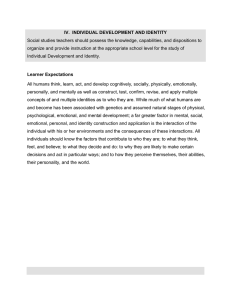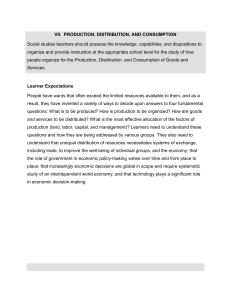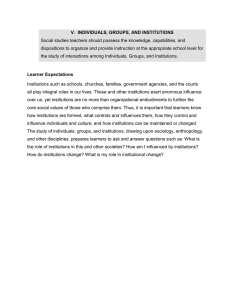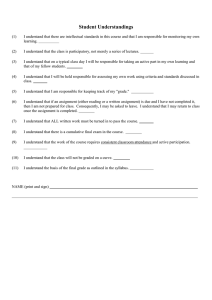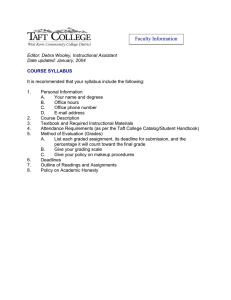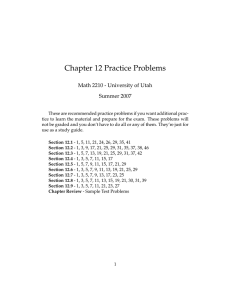UNIVERSITY COMMITTEE ON CURRICULUM (UCOC) MINUTES October 5, 2010
advertisement
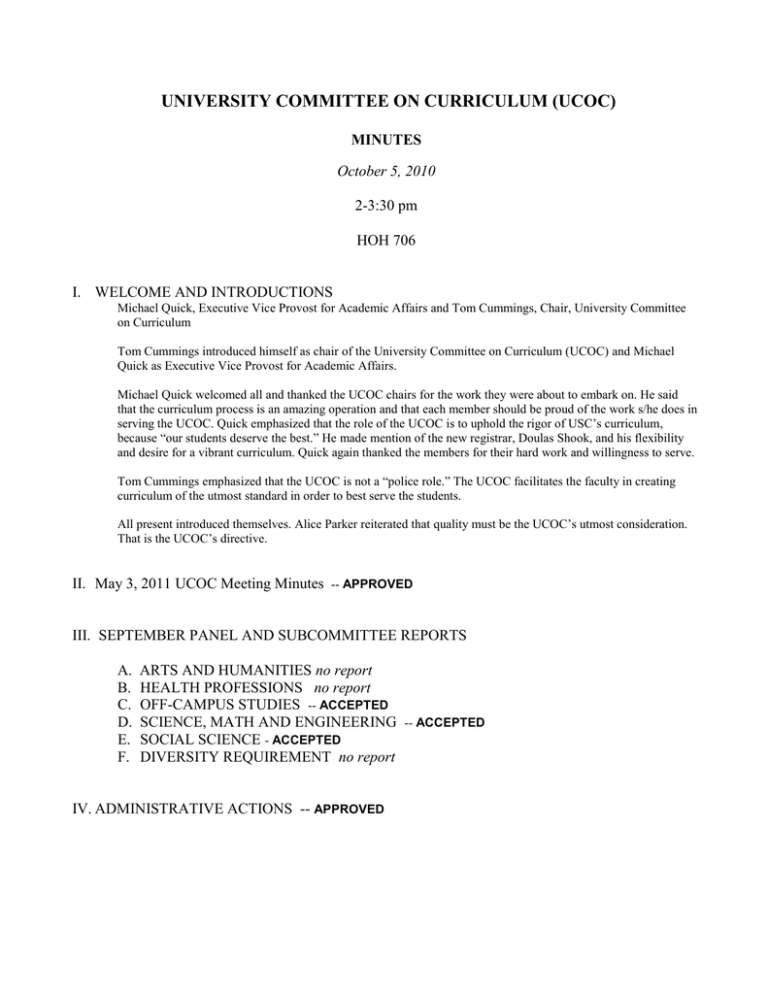
UNIVERSITY COMMITTEE ON CURRICULUM (UCOC) MINUTES October 5, 2010 2-3:30 pm HOH 706 I. WELCOME AND INTRODUCTIONS Michael Quick, Executive Vice Provost for Academic Affairs and Tom Cummings, Chair, University Committee on Curriculum Tom Cummings introduced himself as chair of the University Committee on Curriculum (UCOC) and Michael Quick as Executive Vice Provost for Academic Affairs. Michael Quick welcomed all and thanked the UCOC chairs for the work they were about to embark on. He said that the curriculum process is an amazing operation and that each member should be proud of the work s/he does in serving the UCOC. Quick emphasized that the role of the UCOC is to uphold the rigor of USC’s curriculum, because “our students deserve the best.” He made mention of the new registrar, Doulas Shook, and his flexibility and desire for a vibrant curriculum. Quick again thanked the members for their hard work and willingness to serve. Tom Cummings emphasized that the UCOC is not a “police role.” The UCOC facilitates the faculty in creating curriculum of the utmost standard in order to best serve the students. All present introduced themselves. Alice Parker reiterated that quality must be the UCOC’s utmost consideration. That is the UCOC’s directive. II. May 3, 2011 UCOC Meeting Minutes -- APPROVED III. SEPTEMBER PANEL AND SUBCOMMITTEE REPORTS A. B. C. D. E. F. ARTS AND HUMANITIES no report HEALTH PROFESSIONS no report OFF-CAMPUS STUDIES -- ACCEPTED SCIENCE, MATH AND ENGINEERING -- ACCEPTED SOCIAL SCIENCE - ACCEPTED DIVERSITY REQUIREMENT no report IV. ADMINISTRATIVE ACTIONS -- APPROVED UCOC Minutes October 5, 2010 Page 2 of 11 IV. OLD BUSINESS A. Sample Syllabus Template (Joan Getman, Director for Educational Technologies) Attachment: Sample Syllabus, Online and Hybrid Courses DISCUSSED AND DEFERRED: Joan Getman presented a draft version of a syllabus template which provided extensive guidelines for faculty teaching online and hybrid courses. UCOC members asked that a statement similar to the following be added to the syllabus: “An equal educational experience should be maintained for all students, regardless of course format.” Members felt that the course outcomes should be the same, regardless of whether students are taking an online, hybrid or traditional course. They also noted that a UCOC review is not required for courses or programs that change format. Getman preferred that faculty have one syllabus template to refer to, as all courses will have some sort of technological component (at least, Blackboard) for which student/faculty expectations will need to be clarified. She also addressed the need for a statement addressing “Emergency Preparedness/Course Continuity in a Crisis” to be added to the one standard syllabus template. At the suggestion of Tom Cummings, Joan Getman agreed to work with Edwenna Werner and the Curriculum Coordination Office (CCO) to create a second version of the syllabus template, merging the current CCO standard syllabus with the proposed online/hybrid version. It was agreed that the resources are useful in the sample syllabus template; however, the fact that courses without extensive online content do not need to deal with all of the resources would have to be clarified. Tom Cummings also recommended that the sample syllabus include “Template” in the title, and that it would be helpful to have some exemplar syllabi of online, and/or blended, courses to add to the currently posted exemplar syllabi of traditional mode courses. A web-based syllabus template was suggested. Joan Getman said that Stanford utilized an online syllabus maker; however, when that was broached to faculty, the concern was raised that it would limit freedom. Perhaps it could be offered as an option, and not a requirement. B. Internship Guidelines -- APPROVED Line added to Curriculum Handbook, Attachment 4: “Guidelines for Undergraduate and Graduate Internship Courses,” V. Grading, No. 3: UCOC, at the May 3, 2011 meeting, stated: The instructor of record, responsible for grading, must be a USC faculty member, not a staff member. C. Laptop and Cell Phone Use in Classes and Increased Absenteeism (Steven Lamy, Vice Dean for Academic Programs) DISCUSSED AND APPROVED: The pros and cons of technology in the classroom were discussed. In favor, members cited the opportunity for increased engagement. A topic addressed by a professor could be looked up by students instantaneously and that information used to further the conversation. The UCOC members did not want to discourage the use of electronics. On the other hand, a member addressed the issue of students following their Facebook accounts or shopping online while in the classroom, and potentially distracting their classmates. Again, the issue of student engagement was raised and the idea presented that technology be used as a tool for the lecture; therefore, students would not have time to be diverted into other areas of the internet. UCOC agreed that guidelines on use of technology in the classroom should be up to the individual instructor. There should not be a university policy, and the Curriculum Coordination Office and UCOC need not review statements in syllabi regarding use of technology. However, Tom Cummings suggested that several sample statements on the use of technology in the classroom be posted on the curriculum website, or included in the sample syllabus, ranging from more lenient to more strict. UCOC members were encouraged to contribute their technology statements to the CCO to be used as UCOC Minutes October 5, 2010 Page 3 of 11 examples. Two of the examples to include could be the first one on page three, used by Tom Cummings, and one used by Alice Parker, simply: “Please turn off the ring on your phone and the sound on your laptop.” The second example below was considered by some to be a bit harsh and would probably not the best example. FROM THE MINUTES OF THE 5/3/11 UCOC MTG: DEFERRED: Steve Lamy brought up two issues which are of concern to many faculty, although it is not clear if either UCOC or CAPP has jurisdiction in this area. One is whether or how to ban the use of laptops or phones in the classroom, and the second is how to deal with students not attending class. In some student subcultures, students think that if lectures are online, there is no point in going to class. It was suggested that sample statements about the use of computers and phones might be provided for faculty who wanted to use them. It was pointed out that a faculty member may not assign points for attendance, but may subtract points for absences. Faculty could be reminded of the control they can exert on attendance by reducing grades for non-attendance. These topics will be discussed further in the fall, after gathering information about it over the summer To prompt discussion of this topic, two sample statements about the use of electronic devices that have appeared in recent syllabi: 1. Statement on Technology Use Please note that computer laptop use is not allowed during the discussion and lecture sessions. It is far more important to participate than to take detailed notes. A few hand-written notes will suffice. After each discussion and lecture session, you may want to take some time to reflect on the learning experience and type up whatever notes seem useful. All communication devices such as cell phones, Blackberries, etc. capable of sending and or receiving electronic communication and all entertainment devices such as iPods or other MP3 players are to be turned off and kept off throughout the class session. Receiving or sending communication or entertainment during class disrupts the learning environment and is rude to those around you. Instructors may deny Participation/Contribution points to students misusing technology during class. We invite you to "Be Here, Be Present!" to create an engaging learning community. 2. Policy on Electronic Devices: Please turn off all pagers, cell phones, MP3 players, wireless PDAs, handheld devices and other electronic communication devices before class. When any of your electronic devices (including your cell phone) rings or buzzes or lights up or vibrates, you disturb the class, your classmates, your instructor and the environment of mutually beneficial learning. In addition, you take valuable time away from our class discussion and community. Accordingly, in order to foster a positive environment for learning, please turn off your Wi-Fi access and limit your computer activity to note taking or the reading of documents. As you know, it is a privilege to use laptops in the classroom setting; please do not abuse your access. If any of your electronic devices (including your cell phone) ring, beep, or disturb the class, I will ask you a question from the reading. If you are unable to answer the question correctly, you will lose ten points off the top of your participation grade. There is no limit to the amount of points you can lose. If I catch you using the Internet for any non-class related activity (including e-mail, texting, IM-ing, Facebook updating, tweeting, gaming, chatting, online shopping, application downloading or taking advantage of any number of other wondrous Internet opportunities) you will automatically be marked absent for that class and lose ten points and lose the privilege of using any device in class. Please be a good citizen. In considering a policy regarding the use of laptops and cell phones in the classroom, the CCO would like to address: a. b. Should there be a university-wide policy? Who should create the policy? UCOC Minutes October 5, 2010 Page 4 of 11 c. d. Who should enforce the policy? Should it be in the sample syllabus template? NOT DISCUSSED: The issue of absenteeism arose briefly but was not discussed in any detail. Student engagement appeared to be an underlying answer. D. Student Participation in UCOC (Tom Cummings, Chair, University Committee on Curriculum) DISCUSSED AND APPROVED Edwenna Werner presented the fact that without the monthly subcommittee meetings of the past, students are currently usually given no role in reviewing course curriculum. Tom Cummings agreed that students should be more involved in the process and called on the chairs to forward proposals not only to their “plus one” but also, when it would be useful, to the students invited by the Provost to participate on their sub-committee. Cummings felt that having one graduate and one undergraduate student at the monthly UCOC meeting is appropriate. V. NEW BUSINESS A. Deadline for Submission of Subcommittee Reports (Edwenna Werner, Assistant Dean, Academic Records and Registrar) DISCUSSED AND APPROVED Edwenna Werner presented the question of sub-committee review submission deadlines. In prior years, the UCOC meeting was on Tuesday and that necessitated subcommittee chair decisions to be in by Thursday noon, so that the reports could be compiled by the CCO by Friday afternoon for the committees’ review over the weekend. She asked whether, with the meetings now scheduled on Wednesdays, subcommittee chairs would prefer to aim for a Friday noon submittal, but if needed, have the weekend to finish the review of proposals. The CCO will make the report based on what has been received by Monday morning, and reports will be delivered via email by Tuesday afternoon or evening. The UCOC members agreed that this was the preferred arrangement even if that meant having less time to review the final reports before the Wednesday meeting. V. INFORMATION ITEMS A. GOULD SCHOOL OF LAW Items 1a, 2a and 2b were not previously reported at the UCOC. 1. Add one new course a. 2. Eff/Term Spring 2011 LAW 728 Topics in Amateur Sports Law [1, or 2] Focuses on the legal and institutional regulation of high school and collegiate sports and the business transactions that are an integral part of collegiate sports. Revise two courses a. Req. by Robert K. Rasmussen Eff/Term Spring 2011 LAW 781 Clinical Internship/Externship I CURRENT: A clinical internship or judicial externship allows a student to gain hands-on legal experience in legal settings. Students will be assigned to a legal services program, government agency, state or federal judges, under faculty supervision. Graded CR/NC. [1-10] UCOC Minutes October 5, 2010 Page 5 of 11 NEW: A clinical internship or judicial externship allows a student to gain hands-on legal experience in legal settings. Students will be assigned to a legal services program, government agency, or state or federal judge under faculty supervision. Graded CR/D/F. [1-13] b. 3. 4. LAW 782 Clinical Internship/Externship II Advanced clinical training/externship. Graded CR/NC. CURRENT: [1-10] NEW: [1-13] Add five new courses Eff/ Term Fall 2011 a. LAW 640 The United States Supreme Court [1-4] Introduction to the state of the art in legal and social-scientific work on the United States Supreme Court. b. LAW 723 Law, Literature and Feminism [1-4] Looks at the inter-weaving of the culture wars, feminism and law, with a particular focus on questions of choice, marriage, and the family. c. LAW 850 International Human Rights Clinic II [4, or 5] Continuation of the International Human Rights Clinic. Prerequisite: LAW 849. d. LAW 875 Theories of Constitutional Interpretation [1-4] Seminar course devoted to different methods of reading the Constitution. e. LAW 811 Law and Medicine [2-4, max 8] Explores the “social determinants of health,” including medical, legal, social, environmental, and behavioral factors affecting the health of individuals and communities, especially poor, vulnerable populations. Revise fourteen courses Eff/ Term Fall 2011 a. LAW 510 Legal Research [0, or 1] CURRENT: Examination of the basic sources of law for federal and Californiajurisdictions; utilizing a vast array of sources from books tocomputer-assisted research and analyzes methodology and techniques. Graded CR/D/F. NEW: Examination of the basic sources of law for federal and California jurisdictions, utilizing a vast array of sources from books to computer-assisted research and analyzing research methodology and techniques. Graded CR/D/F. b. LAW 602 Criminal Procedure Criminal procedure in the courts, and the regulation of law enforcement by the courts through rules of evidence and interpretation of the Bill of Rights. CURRENT: [3] NEW: [2-4] c. LAW 643 Securities Fraud Litigation [2-4] CURRENT: This course will examine the laws governing fraud in securities markets. The course will focus on several sections of the Securities Exchange Act of 1934 including fraudulent statements and insider trading, fraud in th;e takeover context, fraud in proxies, and controlling personal liability. NEW: Examination of the laws governing fraud in securities markets. Focus on several sections of the Securities Exchange Act of 1934, including fraudulent statements and insider trading, fraud in the takeover context, fraud in proxies, and controlling personal liability. UCOC Minutes October 5, 2010 Page 6 of 11 d. LAW 645 Realities of Commercial Lending [1-4] CURRENT: Involves issues including loan restructuring, what loan agreements cover, how representations, covenants, default and financial and repayment terms interrelate, and how security documents fit in. Graded CR/NC. NEW: Involves issues including loan restructuring; what loan agreements cover; how representations, covenants, default and financial and repayment terms interrelate; and how security documents fit in. Graded CR/D/F. Prerequisite: LAW 642. e. LAW 663 European Union Law [2-4] CURRENT: Introduction of the EU legal system and an understanding of the functioning EU, constitutive treaties, and evolving judicial and regulatory system being established within Europe. Open to law students only. NEW: Introduction to the EU legal system and an understanding of the functioning EU, constitutive treaties, and evolving judicial and regulatory system being established within Europe. f. LAW 736 Small Business Clinic I [2-4] Students provide legal assistance to small businesses, entrepreneurs and non-profit organizations that cannot pay market rates for legal services. Graded CR/NC. CURRENT: Prerequisites: LAW-603 and 1 from (LAW-727 or LAW-827) NEW: No prerequisites g. LAW 747 Constitution in the 20th Century [2-4] CURRENT: This course examines the impact of historical events, world wars, cold war and civil rights and understanding the role of the Constitution in American life. NEW: This course examines the impact of historical events, world wars, the Cold War, and civil rights, and understanding the role of the Constitution in American life. h. LAW 763 Federal Courts: The Federal System II [3-5] CURRENT: Problems of adjudication in the federal system. Allocation of authority between federal and state courts, and among Congress, the Executive and the Courts; choice of federal and state law; jurisdiction of federal courts and significant rules of practice. NEW: Problems of adjudication in a federal system. Allocation of authority between federal and state courts and among Congress, the Executive and the Courts; choice of federal and state law; jurisdiction of federal courts and significant rules of practice. i. LAW 776 Immigration Clinic I [2-4] CURRENT: Students represent clients before the Immigration and Naturalization Service, the Immigration Court, and certain law enforcement agencies in cases including applications for relief under the Violence Against Women Act, for asylum, and for relief from deportation. Graded CR/D/F. NEW: Students represent clients before Immigration and Customs Enforcement, the Immigration Court, and certain law enforcement agencies in cases including applications for relief under the Violence Against Women Act, for asylum, and for relief against deportation. Graded CR/D/F. j. LAW 781 Clinical Internship/Externship I [1-13] CURRENT: A clinical internship or judicial externship allows a student to gain hands-on legal experience in legal settings. Students will be assigned to a legal services program, government agency, state or federal judges, under faculty supervision. Graded CR/NC. NEW: A clinical internship or judicial externship allows a student to gain hands-on legal experience in legal settings. Students will be assigned to a legal services program, government agency, or state or federal judge under faculty supervision. Graded CR/D/F. UCOC Minutes October 5, 2010 Page 7 of 11 k. LAW 849 International Human Rights Clinic I Students work under close faculty supervision on cases and projects that involve the application of international law to address human rights violations. CURRENT: Unit value: [2-4] NEW: Unit value: [4-5] l. LAW 870 Legal Writing Fellows CURRENT: Assist in teaching writing and advocacy. Responsibilities include helping prepare lesson plans and draft writing assignments and sample answers; leading class exercises; and judging firstyear moot court practice rounds. Graded CR/D/F. Unit value: [1-4] NEW: Assist in teaching writing and advocacy. Responsibilities include helping prepare lesson plans and drafting writing assignments and sample answers; leading class exercises; and judging first-year moot court practice rounds. Graded CR/D/F. Unit value: [1-4, max 7] m. LAW 884 [3-4] Focuses on individual rights and liberties, with special attention paid to equal protection and substantive due process. CURRENT: Title: Equality and Liberty NEW: Title: Constitutional Law: Equality and Liberty n. 5. 6. LAW 888 [1-3] Explores the laws that govern and affect religious groups and religious belief-systems and religious experience in the United States. CURRENT: Title: Law and Religion in American Law and Culture NEW: Title: First Amendment: Law and Religion Add three new courses Eff/Term Spring 2012 a. LAW 522 Legal Writing Overview [3 or 4] Develops written analytic skills. Includes short exercises that progress to drafting legal memoranda. Teaches advocacy through drafting legal briefs and client letters. Graded CR/D/F. b. LAW 797 Public Policy in Law: Analysis and Advocacy [1-4] Focuses on contemporary policy problems, identifies relevant legal issues and utilizes multidisciplinary techniques found in law, political science, economics and history to formulate positions. Cross-listed as PPD-797. c. LAW 864 International Insolvency [1-4] Deals with multi-jurisdictional insolvency. Examines the insolvency laws of several different countries as well as Chapter 15 of the US Bankruptcy Code and other issues. Revise one course a. LAW 648 Topics in Entertainment Law [1-4, Max 8] Contemporary topics in the field of entertainment law. CURRENT: Corequisites: LAW 650 and LAW 772 NEW: No corequisites Eff/Term Spring 2012 UCOC Minutes October 5, 2010 Page 8 of 11 ARTS AND HUMANITIES (AHS) B. ROSKI SCHOOL OF FINE ARTS This program termination was inadvertently overlooked. 1. Terminate one program a. Eff/Term Summer 2011 Master of Public Art Studies/Master of Arts Jewish Communal Service, POST 805 “Jewish Communal Service” was renamed to “Jewish Nonprofit Management.” HEALTH PROFESSIONS (HPS) C. OSTROW SCHOOL OF DENTISTRY Revision approved by the CAPP chair and the Executive Vice Provost over the summer. 1. Add Graduation Requirement a. Eff/Term Fall 2011 Doctor of Dental Surgery The requirement of passing Part I and Part II of the National Dental Board Examinations was added. D. KECK SCHOOL OF MEDICINE 1. Program Terminated a. Eff/ Term Summer 2011 M.S., Pathobiology The M.S. should have been terminated when the PhD in Pathobiology was terminated. E. SCHOOL OF PHARMACY These changes were approved on the HPS minutes, April 2011, Effective 2012. The effective date was changed to Fall 2011 over the summer. 1. Revise a program Eff/Term Fall 2011 a. Doctor of Pharmacy [144] Modify unit value for two required courses (one unit more for one and one unit less for the other). b. Revise two courses Eff/Term Fall 2011 i. PHRD 557 CURRENT: Therapeutics I [5] Introduction to principles of pharmacology, pharmacokinetics, medicinal chemistry and therapeutics. NEW: Therapeutics I: Introductory Principles [4] Integrated teaching of the principles of pharmacology, biomedicinal chemistry, pharmacogenomics and clinical therapeutics. Open to Doctor of Pharmacy students only. ii. PHRD 559 CURRENT: Therapeutics II [2] Integrated teaching of pharmacogenomics and biotechnology with emphases on general principles, diagnotstic, and future technology. NEW: Therapeutics II Pharmacokinetics [3] Integrated teaching of basic and clinical pharmacokinetic/ pharmacodynamic concepts. Open to Doctor of Pharmacy students only. UCOC Minutes October 5, 2010 Page 9 of 11 SCIENCE, MATH AND ENGINEERING (SES) F. DORNSIFE COLLEGE OF LETTERS, ARTS AND SCIENCES 1. Revise one minor Eff/Term Fall 2012 The information provided in the May 2011 minutes was incorrect (not what the SES approved). The correct information is: a. 2. Minor in Neuroscience CURRENT: Required Units: [16] NEW: Required Units: [20-28] Four required courses: PSYC 274, BISC 421, NEUR 408, PSYC 440, and a 300-400 level elective from the departmental list of electives. Units will vary depending on whether the student has previously taken prerequisites for the required courses. Create one course The title in the April SES minutes was incorrect. The title is: a. CSCI 568 Eff/Term Fall2011 Requirements Engineering SOCIAL SCIENCE (SSS) G. DORNSIFE SCHOOL OF LETTERS, ARTS AND SCIENCES “Duplicates credit in” language was removed in Summer 2010, Effective Fall 2010, but was not reported to the UCOC in Fall 2010, as it should have been. 1. Revise four courses Eff/Term Fall 2010 a. ECON 203 Principles of Microeconomics [ ] CURRENT: Behavior of firms and consumers, functions of the price system, competition and monopoly, labor markets, poverty, government regulation, international trade, and the environment. Duplicates credit in 251. NEW: Behavior of firms and consumers, functions of the price system, competition and monopoly, labor markets, poverty, government regulation, international trade, and the environment. b. ECON 205 Principles of Microeconomics [ ] CURRENT: Unemployment, inflation and output determination and links.Effects of government taxation and spending on growth, investment,saving, consumption, and trade. Duplicates credit in ECON 252. NEW: Unemployment, inflation and output determination and links. Effects of government taxation and spending on growth, investment, saving, consumption, and trade c. ECON 251x Microeconomics for Business [4] CURRENT: Development and business applications of: theory of the firm; theory of the consumer; intertemporal decisions; decisions under risk; market failures; industrial and enterprise structure. Duplicates credit in ECON 203. NEW: Development and business applications of: theory of the firm; theory of the consumer; intertemporal decisions; decisions under risk; market failures; industrial and enterprise structure. UCOC Minutes October 5, 2010 Page 10 of 11 d. ECON 252x Macroeconomics for Business [4] CURRENT: Theoretical development and significance to business and markets of economic growth; inflation; unemployment; monetary and fiscal policy; business cycles; savings and investment; exchange rates. Recommended preparation: introductory economics course, high school math, and algebra. Duplicates credit in ECON 205. NEW: Theoretical development and significance to business and markets of economic growth; inflation; unemployment; monetary and fiscal policy; business cycles; savings and investment; exchange rates. Recommended preparation: introductory economics course, high school math, and algebra. H. ROSSIER SCHOOL OF EDUCATION This program revision was approved, as an exception, during the summer. 1. Revise one program Eff/Term Fall 2011 Master of Arts in Teaching (MAT), Single Subject CURRENT: Required Units: Non-credential Option [27]; Credential Option [29] NEW: Required Units: Non-credential Option [30]; Credential Option [32] One additional 3-unit required course was added: “Additional course work in the subject matter area to be approved by the subject area lead.” UCOC Minutes October 5, 2010 Page 11 of 11 Members present Members absent Guests Diane Badame Laura Baker Todd Brun Stephen Bucher Doug Burleson (support staff) Thomas Cummings (chair) Jo Ann Farver Jared Ginsburg (student) Geoffrey Middlebrook Kristine Moe (support staff) Michael Paine Alice Parker Michael Quick (ex-officio) Douglas Shook (ex-officio) Lynn Sipe (ex-officio) Sheila Sofian Mark Todd (ex-officio) Aimee Bender Janet Levin Gene Bickers (ex officio) Judy Garner Sarah Armand (student) Steven Lamy Janet Levin Sally Pratt (ex-officio) Edwenna Werner (ex officio) Joan Getman
